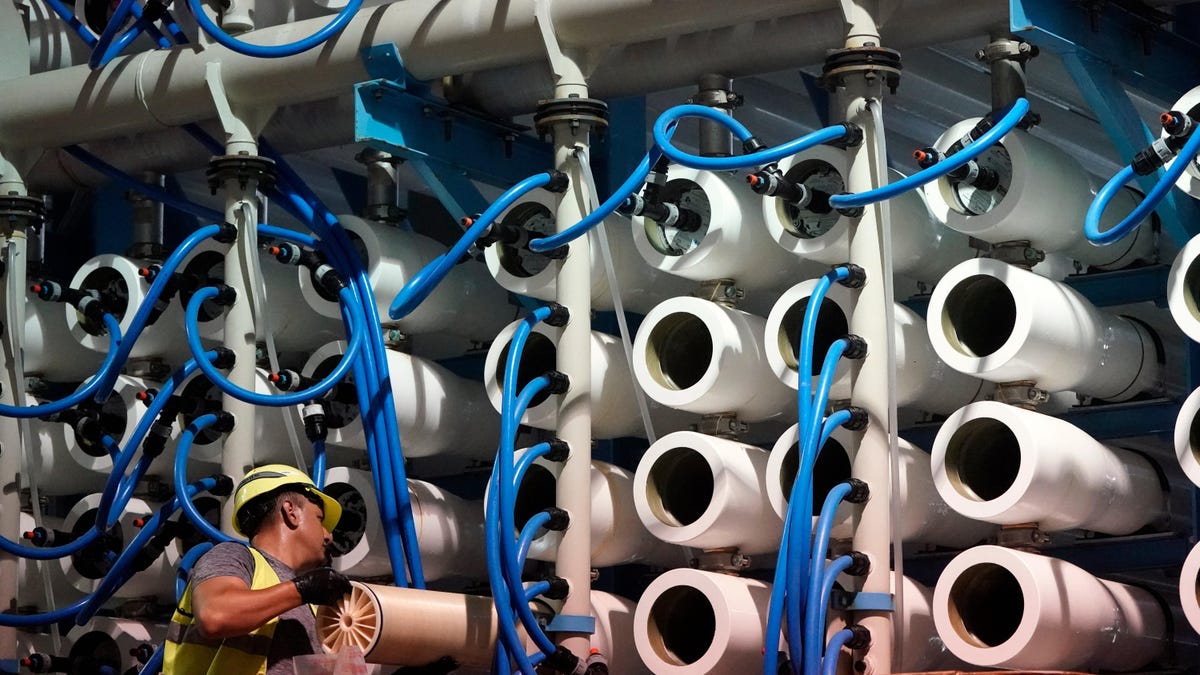California regulators are likely to approve a new water desalination plant today as state officials look for solutions to ongoing water shortages, as the state struggles through its worst drought in over 1,000 years.
And the brine they dump isn't great for the area they dump it in. The better way to solve the water crisis would be to regulate water usage but we can't do that this is America.
I don't know if that's really true. A lot gets made about whatever celebrity is watering their two acre lawn, and golf courses and stuff, but I think most of Cali's water goes to irrigate the central valley, which produces 60% of the fruits and vegetables Americans eat. Consumer overuse of water is a drop in the bucket compared to agriculture.
But a lot of that water goes to grow alfalfa, which is only used as a feed crop for cattle, and almonds, which are all shipped to China. Both are incredibly water-intensive crops.
Comparatively, the amount of water that gets used for vegetables that Americans eat is much smaller.
The central valley could easily not grow almonds and grow feedstock grain for cattle that uses less water, but the state has done very little to push the ag business in this direction.
I've heard that some farmers' water rights date back to some treaty with the Spanish when they controlled CA, but have never confirmed it.
its possible to make the dumping fine but they like shaving costs so they just dump it all in one spot. if there were many dumping zones itd be fine. hell if you just found a way to dump it farther from shore thatd be a huge upgrade
but no they like to take all the toxic sludge and dump it in one spot repeatedly for years and then are shocked when the environment is devastated by heavy metals and radioactive materials
Half baked thought that could definitely have issues, including that I have no idea how much of said sludge is produced: Put the sludge on container ships and have them drop it periodically across the ocean
yeah its not completely unreasonable. they might need to filter out stuff that will just coalesce in one spot no matter what but all that stuff is just naturally part of the ocean is the thing
Eventually the price for rare minerals will get high enough that processing of brine will be profitable.
I feel like California has the worst drought in over 1,000 years every year
enjoy the environmental contamination california
lets go swim in toxic sludge :spongebob-party: instead of stopping golf courses and lawn culture and overfarming and industrial misuse of water
Water for crops to feed to cows : 10^10 gallons.
Someone who is good at water conservation please help me my state is drying up
Building a large industrial facility to fill my state's millions of private swimming pools, then dumping all the excess salt back into the bay to destroy thousands of acres of aquatic wildlife.
I assume the salt and untreated effluents will be dealt with the usual way - pumped into the ocean. Eventually the pollution will need to be cleaned up. It's the capitalist circle of life.
stonks based thinking informs me that with enough water desallination plants we don't really need rivers and stuff like that so just dump everywhere inland and make cool sculptures out of salt
We can use the salt to seal up the nuclear waste we don’t know what to do with. I’m sure nothing bad could come out of this arrangement.
Radioactive water soluble salt?! How could we have foreseen this?!
Are they still trying to farm stuff in the desert over there?
California is relatively unique in that farming incentives show up at the city, county, and state level.
Most states never allowed cities/counties to make the sort of incentives that Californian farmers use in some areas - especially wine country.
In some places in California it can also takes decades to unwind agricultural land for residential/commercial use. Folks inherit a few-acres-big family farm, can't farm one year or have a bad season, can't turn the land into residential/commercial, and lose everything including their house because of property taxes.
I can’t find a proposed completion date for this toxic sludge factory, but I wager that there will be a large scale crop failure in the Central Valley before it’s brought online
The Central Valley is, ironically, only a desert because of agriculture. The whole thing used to basically be seasonal wetlands, prior to colonization.
Is desalination a good thing going forward? Or are there better alternatives when drinking water gets increasingly scarce?
Speaking purely from a technical perspective, if renewable energy were to scaled up somehow it probably makes sense to do it. I don't know of any downside other than the immense energy inefficiency of the process, but in this case the increasing scarcity of water is pushing the economics toward getting water no matter the cost. It's unfortunate that the environmental cost of using up all the water and then switching to desalination is not factored in under capitalism. I guess I'm just hoping that renewable energy tech/infrastructure can get in place soon enough,, the future of humanity kind of depends on it right now.
My understanding is that it has a notable environmental impact since they have to pump that saline slurry back into the ocean which then creates an uninhabitable zone for fish. If you've seen anything about brine pools at the bottom of the ocean, it's basically the same concept but instead we're just creating a brine cloud in the ocean. On a global scale it's less significant, but on a regional level it can really hurt the creatures and mess up all sorts of stuff.
I don't see why they would have to do that, but I'm sure they will do it rather than store it on land or something (which would be its own form of pollution anyway). More research needed on my part
Speaking purely from a technical perspective, if renewable energy were to scaled up somehow it probably makes sense to do it. I don’t know of any downside other than the immense energy inefficiency of the process
When you take salt water and pull out all the water, you're left with enormous amounts of salt-brine. Then you're left with the question of what to do with the new pile of waste you've created.
Guess how the Middle East handles this problem.
Producing one liter of fresh water produces about 1.5 liters of brine, though there are big differences in the “recovery ratio” (freshwater to brine) between plants, based on the salinity of the source feed water and desalination technology used, Jones explains.
Every day, the nearly 16,000 desalination plants in 177 countries produce 95 million cubic meters of water and discharge 142 million cubic meters of brine.
Over a year, that’s enough to cover Florida under a foot of brine, the authors say.
...
One problem with brine dumping is that it depletes the oxygen dissolved in the receiving waters around the plant, explains Jones. “High salinity and reduced dissolved oxygen levels can have profound impacts on benthic organisms, which can translate into ecological effects observable throughout the food chain,” he says.
The toxic chemicals used in water pre-treatment or as anti-scalants and anti-foulants in the process don’t bring benthic life joy either.
“Development of energy-efficient, cost-effective and environmentally benign concentrate management systems is critical if desalination is to become a major part of a sustainable water future,” pointed out Pei Xu and colleagues in Environmental Engineering Science in 2013.
Glad to hear Pei Xu and colleagues have been working on it. Do we know if an environmentally friendly disposal process has been developed yet? I'm sure it won't be implemented to save cost, but at least we'd have something to fight for.
The article lauds the Israeli approach, so... shrug. Presumably, you can dilute the brine with more sea water and diffuse it across the coastline, so you're not subjecting any single patch of sea to high levels of salinity.
It's the best way to increase the drinking water supply, but it pollutes and uses a ton of power. Using less water on non-critical things, so you don't need to increase the supply in the first place, would be much better.
Somehow they'll find a way to make themselves more on fire with this.
Yeah I'm having a pretty bad week of posting tbh and this would really put the cherry on top lol













